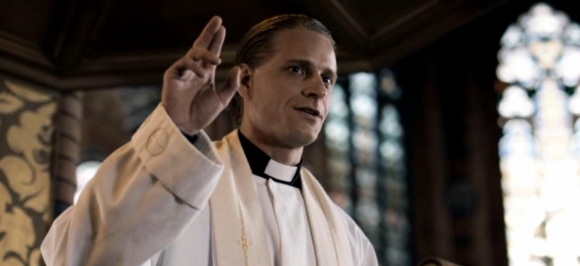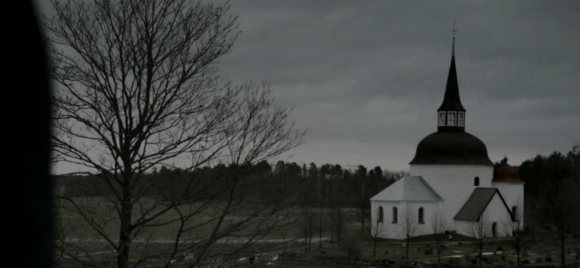
We invite you to read an interview with Fredrik Hiller, the director of an upcoming Swedish horror called „Psalm 21”. It’s another element of the so-called New Wave of Scandinavian Horror, let’s hope it will be as good as „Let The Right One In” or „Sauna”.
„The Exorcist”, „Omen”, but also Carpenter’s „Prince of Darkness”. These movies came to my mind after watching the trailer. Were you indeed inspired by these movies during making „Psalm 21” or am I groping?:)
I’m a big fan of „The Exorcist” and „Prince of Darkness”. The last one is one of the scariest films I’ve ever seen. „The Ring”, „The Sixth Sense” and „Fragile”, however, were the greatest inspirations.
With such movies like „Psalm 21” (horrors with christian symbolism) there is always a possibility that someone wouldn’t like what he’ll see and accuse the filmmakers of blasphemy or something like that. Will „Psalm 21” give any reasons for such people to think like that or did you try to avoid controversial elements?
I’m trying as hard as I can to induce controversy. I despise religions and the mental rape they have committed against humankind, their demonizing of nature, natural inclinations and women. I think many people will hate me and my film. My dream is for the Pope to condemn me and my film. If that happens, I will die a very happy man. :)

Many today’s horrors (especially in Hollywood) prefer „modern” approach to horror matter. You know, „mindblowing twists” every 15 minutes, fast editing (which only causes headache) and making an idiot out of the audience. Your movie though seems rather classic in form (except that little girl CGI effect). Am I right?
Yes. „Psalm 21” is very classically told, shot and edited. I hate MTV-editing and dumbing down to the audience. I think the audience is every bit as intelligent as we are – or even more so. Even if they individually may not be smarter than us, collectively, something happens when minds focus on a story. The audience is always as smart or smarter than the storyteller.
Fast cutting, in my mind, is a desperate attempt from desperate filmmakers to try to cover up the fact that they have little to tell. Look at the masters – Polanski, Shyamalan in the „Sixth Sense”, Hitchcock. No fast editing anywhere. Quite the contrary. And you as an audience are spellbound.
Fast editing for the sake of fast editing is to film what steroids is to athletics. They give fast, quick results – that come with a terrible price.
The twist, which every good story should have, an every classic story has, comes at the end.
In which way you’re trying to scare the audience? I assume you prefer more psychological play rather than simple jump-scares?
We employ both. We have some old-fashioned jump-scares. But we try to work them. For instance, one jump-scare is devoid of sound or music. Something just emerges in the back. And, of course, that has proved to be one of the scariest moments in the film.
I like to think of scares as the climactic orgasm and the suspense as the intercourse that builds up to the climax. As with intercourse, sometimes the build-up is better than the climax.

Sweden was never famous for horror movies. But situation is changing lately – „Let the Right One In” and now „Psalm 21″… But could you recommend some older Swedish horrors? Were there any?
There is one: „The Visitors” from 1986. It was surprisingly enough excellent. Check it out.
And I must say that „Fanny & Alexander”, although no one would deem it a horror flic, has some very horrific moments.
What are your favourite horrors? Could you pick 3?
„The Sixth Sense”
„Fragile”
„Alien” & „Aliens”
For me, the sole raison d’etre for a film in any genre is that it ends on a positive note. I don’t wish to spend money and time watching something that will leave me in limbo. For me, The Sixth Sense was a revelation. I hate movies that end with evil somehow winning the game anyway – a fist clutching up from below (like the ending in the recent „Drag Me To Hell” or „Darkness”). To me, that’s a total waste of time and money.
As in all storytelling, I think the goal of the storyteller is to drag the audience down to purgatory – and, like Orfeus, back up into the daylight.
I think storytelling is neurolinguistical programming. And as in all programming, we should programme ourselves for success – not darkness.

You’ve played in Robert Zemeckis „Beowulf”. Could you tell as about that experience? What kind of person is Zemeckis?
Zemeckis is a great director. He knows what he wants, yet he is very open to suggestions. It was great to play with Ray Winstone. I also learned from producer Steve Starkey to work hard, and yet have a healthy distance. As he said of the Beowulf production, after telling me about the mind-blowing 200 M USD budget: „Well, well – just another stupid movie.”
Do you have any movie plans for the future?
Yes. A zombie movie called „Zone 261″ and a vampire drama called The Perfect Sacrifice”.
Thank you for the interview.